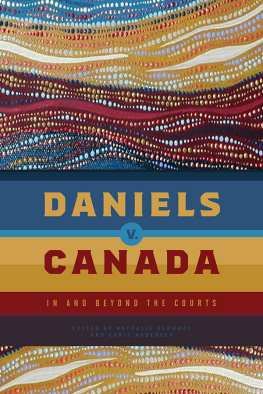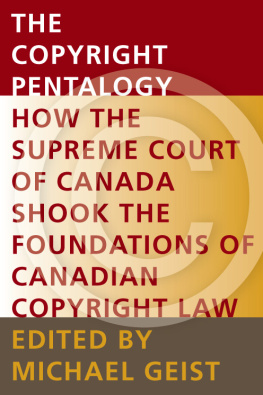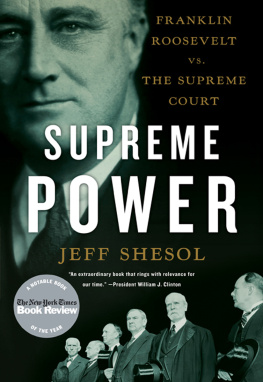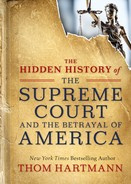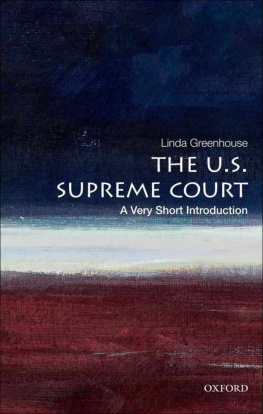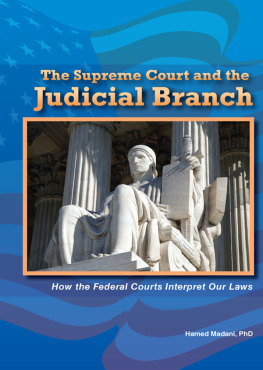We are indebted to a number of individuals and institutions for their help in bringing Daniels v. Canada: In and Beyond the Courts into being. The books foundation was laid at a 2017 conference organized by the Rupertsland Centre for Mtis Research in Edmonton, Alberta, entitled Daniels: In and Beyond the Law. The academic and non-academic participants and audience were all very inspirational during the conference. We gratefully acknowledge the funding received for the conference from the Ministry of Advanced Education, Government of Alberta, as well as the Mtis Nation of Alberta, the Rupertsland Institute, and the Faculty of Native Studies at the University of Alberta. More specifically, we want to acknowledge the support of Audrey Poitras, Mtis Nation of Alberta President; Aaron Barner, Mtis Nation of Alberta Senior Executive Officer; and Lorne Gladue, Rupertsland Institute Chief Executive Officer.
We appreciate the support and advice of the anonymous reviewers, the University of Manitoba Press Editorial Board, Glenn Bergen, and David Larsen at the University of Manitoba Press (UMP). Jill McConkey, acquisitions editor at the UMP, skillfully and patiently guided us through the editorial stages of the book and Maureen Epps copy-editing skills were invaluable to finalize the book. We are also extremely grateful to Chantal Roy Denis, Jenn Rossiter, Amanda Evans, and Leah Hrycun, who worked on the book at different stages of its development.
Introduction
Nathalie Kermoal and Chris Andersen
Ofall the groups in Canada, the Mtis have clearly suffered the most from an inflexible federalism that emphasizes provincial boundaries at the expense of nation-wide interests which transcend those boundaries. Because the federal government precludes any special status for national minorities and avoids the kind of legal responsibility for Mtis that it jealously guards in relation to Indians, the onus for improving the socio-economic condition of hundreds of thousands of Mtis has fallen to provincial governments. The individual provincial governments, however, have amply demonstrated they lack the willto say nothing of the lack of administrative machinery and constitutional powersto tackle the problems of the Mtis which have been, and are, national in scope.... The basic problem, the fundamental issue at stake for Canadas Mtis, is the unwillingness, inability, or incapacity of the federal government to deal with the Mtis as an indigenous people, a national minority with a century-old claim to Aboriginal Rights.
Over the past twenty years, the Supreme Court of Canada (SCC) has played a major role in defining Mtis rights. Though the Mtis were recognized in the Constitution Act of 1982 as one of the Aboriginal peoples of Canada, the federal government continued to exclude them from the kinds of social programs and negotiation processes that First Nations had long been engaged with. For example, lawyer Joseph Magnet and his team discovered a number of government documents indicating that the federal government was very much aware of the fact that the Mtis were far more exposed to discrimination and other social disabilities. It is true to say that in the absence of Federal initiative in this field they are the most disadvantaged of all Canadian citizens. it consciously refused to do so.
With the failed Charlottetown Accord in 1992, the Mtis lost (through no fault of their own) a chance to gain political traction through negotiation with the federal and provincial governments. Indeed, the proposed amendment package to the Canadian constitution would have enshrined an Aboriginal right to self-government for the Mtis people, as outlined in the draft Mtis Nation Accord. Access to programs and funding was central to the accord. In the section on the Mtis, the 1996 report of the Royal Commission on Aboriginal Peoples (RCAP) emphasized that Aboriginal collectivities claiming to be nations of Mtis people should be recognized under the same recognition policy and using the same criteria as applied to all Aboriginal peoples. Following their setback with the Charlottetown Accord, the Mtis turned to the courts and more specifically to the SCC to advance their rights.
In 2003, R. v. Powley became the first major judicial breakthrough for the Mtis peoplethis was perhaps especially notable given that First Nations and Inuit had been making use of the courts for the previous three decades. Hailed as a victory by Mtis organizations, the Powley decision defined Mtis rights as they relate to subsistence hunting. Through the Powley test, the SCC clarified the boundaries and contours of Mtis rights. Two subsequent SCC decisions involving Mtis litigants followed: the Manitoba Metis Federation (MMF) case in 2013 and the Daniels decision in 2016. As Mtis scholar Adam Gaudry explains, In MMF v. Canada the court found that the federal government had failed in its constitutional obligation to protect Mtis interests in the 1870s allocation of Manitoba lands. In effect, the court identified a duty to reconcile Mtis interests in Manitoba lands and necessitated movement towards a bilateral relationship between the MMF and the Government of Canada.
On 14 April 2016, the SCC put an end to a 17 year odyssey that began in 1999. The plaintiffs sought three declarations:
(1) that Mtis and Non-Status Indians (MNSI) are Indians as defined in s. 91(24) of the Constitution Act, 1867;
(2) that the Crown owes a fiduciary duty to Mtis and Non-Status Indians as Aboriginal peoples; and
(3) that Mtis and Non-Status Indians have the right to be consulted and negotiated with by the federal government as to their rights, interests, and needs as Aboriginal peoples.
The court granted only the first declaration, arguing that the other two had already been covered by previous jurisprudence.
At least formally, the Daniels

